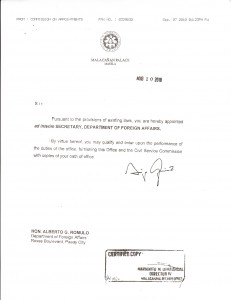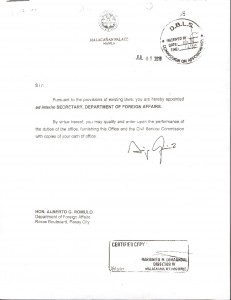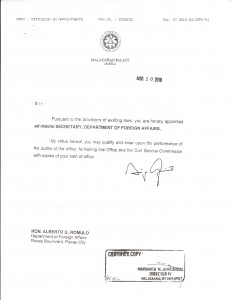By ELLEN TORDESILLAS

 MALACANANG has antedated the appointment papers of Foreign Secretary Alberto Romulo to cure the original that the Commission on Appointments found defective.
MALACANANG has antedated the appointment papers of Foreign Secretary Alberto Romulo to cure the original that the Commission on Appointments found defective.
Romulo, a holdover from the Arroyo administration, took his oath and had been functioning as foreign secretary in the first 40 days of the Aquino administration without an appointment, documents showed.
Romulo took his oath of office on July 1 in Malacañang together with the other Cabinet members. But while the appointment papers of the other secretaries were signed by President Aquino that same day, Romulo’s wasn’t. His original appointment papers were dated Aug. 10.
Malacañang sent the copy of Romulo’s Aug. 10 appointment to the CA third week of August. It said, “Pursuant to the provision of existing laws, you are hereby appointed ad interim Secretary, Department of Foreign Affairs.”
But the CA secretariat informed Malacañang that Romulo’s appointment was illegal because “ad interim” (Latin word for “in or for the meantime”) appointments are done only while Congress is not in session. The 15th Congress convened only on July 26.
An Aug. 10 appointment would have created legal complications as it would open Romulo to charges of usurpation of authority and misrepresentation for his acts from July 1 to Aug. 9, said a foreign affairs official who is also a lawyer.
On Aug. 31, Malacanang submitted another appointment of Romulo to the CA. This time, it was dated July 1.
The foreign affairs official said, “July 1 should be correct. Issuing two appointments shows the Palace is sloppy doing something and withdrawing it after being found to be wrong.”
Another lawyer said antedating appointments undermines Malacañang cases against Gloria Arroyo’s midnight appointments, many of them antedated before March 10 to circumvent the election ban on presidential appointments.
Palace sources said Aquino was reluctant to sign and submit Romulo’s appointment, which was an accommodation to his sisters and the Iglesia ni Cristo, as Aquino doesn’t plan to keep him for long.
Romulo, however, is accompanying the President to the United States next week to attend 65th United Nations General Assembly, and to Hanoi for the summit of the Association of Southeast Asian Nations in October. It would create diplomatic and legal problems if the foreign secretary, the point man in foreign visits, had no official cover.
Romulo’s lack of official appointment had prevented him from attending the 43rd meeting of ASEAN foreign ministers in Hanoi on July 20.
Romulo’s appointment was opposed by the Union of Foreign Service Officers on grounds of incompetence. UNIFORS also questioned the legality of the extension of appointments, from June 30 to Sept. 30, of 21 political ambassadors whose terms were supposed to end when Arroyo finished hers.
Upon Romulo’s recommendation, Aquino extended the service of noncareer ambassadors appointed by Arroyo “in a holdover capacity for a period of three months.”
Executive Secretary Paquito Ochoa earlier said in a press statement, “Everybody stays until they are replaced or until the agreed period (Sept 30), whichever comes first.” He justified the extension, saying it would adversely affect relations with countries political ambassadors were posted.
But in a letter to Aquino last July, UNIFORS said, “There is no basis for claiming that the failure to grant the three-month extension would create a vacuum of power in our missions abroad.”
They cited Sections 26 and 293 of Department of Foreign Affairs Regulations authorizing the next ranking officer, as charge d’affaires, “to take over the affairs of our embassies and consular offices upon the expiration of the term of noncareer ambassadors.”
UNIFORS also cited Article 19 of the Vienna Convention on Diplomatic Relations which states, “If the post of head of the mission is vacant, or if the head of the mission is unable to perform his functions, a chargé d’affaires ad interim shall act provisionally as head of the mission.”
